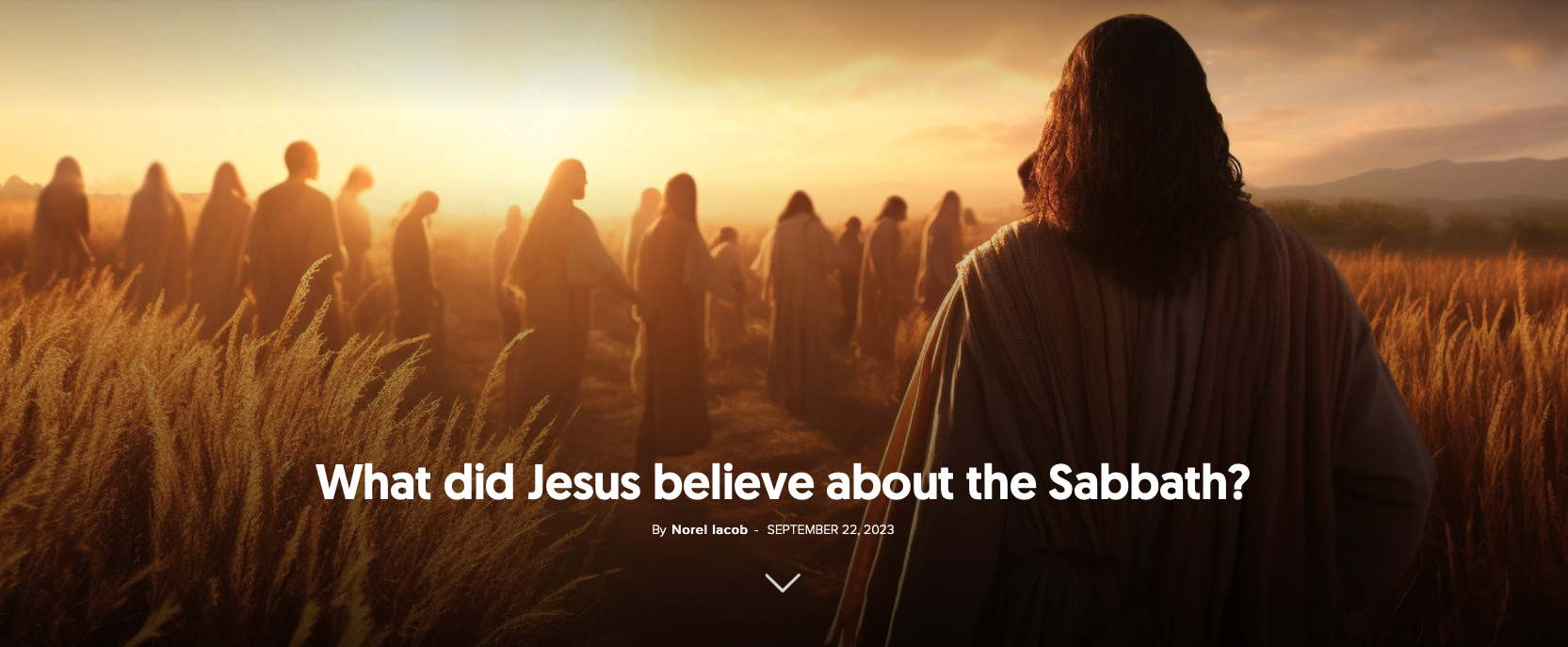“Western societies have transformed Sundays into days where leisure activities have eclipsed the traditional Christian meaning of the day—to devote time to God”[1], Pope Benedict XVI once said, reminding us that the day of rest is a celebration of God’s creation of the world. Observing this day now, when there are worrying signs about the global climate, is a necessity, the Pope added.
To modern mankind, which is always trying to make up for lost time and is faced with the prospect of a relentless existence, God proposes a weekly rest, a Sabbatical rest—a temporal oasis in which to find oneself and understand one’s purpose in the world.
“Time is money” and “the busier you are, the more important you are” are defining phrases for today’s individual mindset. Work addiction has become a common reality and even a goal; in the United States it is considered a “respectable addiction.” Sociologists speak of workaholism, which is defined as “a pathological relationship between a person and his or her work that causes changes in the person’s inner state of mind through compulsive mood swings, loss of control, poor health, and diminished interest in social life.”[2] Caught between obsessive work and an abundance of distractions, people find it old-fashioned and pointless to waste one day a week on physical and mental refreshment. “If you knew Time as well as I do…you wouldn’t talk about wasting it. It’s him,” said the Mad Hatter in Alice in Wonderland.
“But let’s not forget that the office should not automatically become a temple of individual achievement. The idea that a person can only create something lasting at work, that a meteoric career is synonymous with a good life, is ultimately not based on a natural order, but is a human invention. In other words, it is an ideology, a rigid view of the world based on certain rules that its adherents are no longer allowed to question. This true ‘Church of the Career’ has become an all-powerful institution”[3].
Blessed and sanctified
Effective use of time is a difficult balance to achieve in the face of the challenges of everyday life. An important key to solving this problem is contained in the fourth commandment of the Decalogue: “Remember the Sabbath day by keeping it holy. Six days you shall labour and do all your work, but the seventh day is a sabbath to the Lord your God. On it you shall not do any work, neither you, nor your son or daughter, nor your male or female servant, nor your animals, nor any foreigner residing in your towns. For in six days the Lord made the heavens and the earth, the sea, and all that is in them, but he rested on the seventh day. Therefore the Lord blessed the Sabbath day and made it holy” (Exodus 20:8-11). The commandment given to the Jews, freed from slavery in Egypt, was much older and alluded to the week of the creation of the world, when “on the seventh day he rested from all his work” (Genesis 2:2). While Jews and Seventh-day Adventists, for example, observe Saturday as the seventh day of the biblical Decalogue, most Christians celebrate Sunday. What all Christians hold as a common denominator is God’s command that people should set aside one day each week to have a different schedule and different concerns.
In Old and New Testament times, Sabbath rest was very different from the way Christians today understand how to spend this time. The Sabbath was devoted entirely to spiritual life, with Jews preparing themselves as early as Friday so that they would not be occupied with household chores and work on the seventh day. The special character of this day is also underlined by the prophet Isaiah, through whom God spoke to humanity: “If you keep your feet from breaking the Sabbath and from doing as you please on my holy day, if you call the Sabbath a delight and the Lord’s holy day honourable, and if you honour it by not going your own way and not doing as you please or speaking idle words, then you will find your joy in the Lord, and I will cause you to ride in triumph on the heights of the land and to feast on the inheritance of your father Jacob. For the mouth of the Lord has spoken” (Isaiah 58:13-14).
Jesus Christ, for His part, pointed out that the seventh day is a day for acts of kindness to the needy (Matthew 12:11,12) and that “the Sabbath was made for man” (Mark 2:27).
Considered by Roman thinkers to be merely “proof of Jewish laziness,”[4] the Sabbath has survived despite criticism, its value stemming from its heavenly origin: “Then God blessed the seventh day and made it holy, because on it he rested from all the work of creating that he had done” (Genesis 2:3). Sabbath rest is also on God’s list of promises for eternal life in a perfectly restored world (Isaiah 66:23).
AJ Jacobs’ intriguing experiment
There are plenty of people who believe that keeping the seventh day according to the biblical canon is a restriction of freedom. This was the opinion of AJ Jacobs, editor of Esquire, who set out to experiment with living by the rules of the Bible for a year. Jacobs believed that a literal interpretation of the Bible and a life lived according to that interpretation, as in some fundamentalist Christian circles, inevitably leads to irrational behaviour. For 365 days, Jacobs didn’t shave, didn’t wear mixed-fibre clothing, and tried to love his fellow people as himself—in other words, to obey the Ten Commandments, including the fourth.
A workaholic, Jacobs recounts how Sabbath observance began for him. At first, it was painful to give up the things he was used to doing every day. “The first week, I told myself: no checking of email [on the Sabbath]. I lasted all of an hour, after which I told myself, well, I won’t open the emails themselves. I’ll just scan the subject headers. That doesn’t count as working. So I clicked on the mail. Hmm. An email from my mom. The Bible does say to respect your parents. And maybe it’s urgent.”[5] It wasn’t easy, but the effort to follow the Bible literally resulted in a bestseller, The Year of Living Biblically. Surprisingly, Jacobs, the man who set out to prove that living biblically makes you ridiculous, concluded, “I’ll be doing things differently than I did thirteen months ago, things both big (resting on the Sabbath) and small (wearing more white clothes).”[6]
“Technical civilisation is man’s conquest of space. It is a triumph frequently achieved by sacrificing an essential ingredient of existence, namely, time. In technical civilization, we expend time to gain space. To enhance our power in the world of space is our main objective. Yet to have more does not mean to be more. The power we attain in the world of space terminates abruptly at the borderline of time. But time is the heart of existence,”[7] wrote Abraham Joshua Heschel, one of the most renowned rabbis of the last century. The space-oriented person has, collects, possesses, and conquers, as opposed to the time-oriented person who gives, shares, and seeks. Heschel observes that in the Bible, time takes precedence over space, since the biblical world is described from a temporal perspective. The Bible speaks of generations and events rather than possessions and objects.
The transience of life is linked to the prospect of eternity, and for this reason time is given a special value in the books of the Bible. In time, more than in space, people are able to communicate, love, and worship. However, no two moments are the same, and it is precisely this uniqueness of the moment that calls for the wise use of time. “There is a time for everything, and a season for every activity under the heavens,” wrote the wise Solomon (Ecclesiastes 3:1). And yet, modern people create great imbalances by spending their time resources in exclusive directions—work, study, consumerism, and so on. They give up what they can be for what they can have, like Dostoyevsky’s ambitious character Arkady Dolgoruki, the teenager determined to eat only bread in order to reach his ultimate goal—money. “Six days a week we live under the tyranny of things of space; on the Sabbath we try to become attuned to holiness in time. It is a day on which we are called upon to share in what is eternal in time, to turn from the results of creation to the mystery of creation; from the world of creation to the creation of the world.”[8]
The benefits of rest
The validity of Sabbath rest and the Fourth Commandment, as well as the controversy over the identity of the Sabbath (whether it is Saturday or Sunday), are the questions most often raised on this subject. The value of the Sabbath and the importance of keeping the seventh day remain somewhere in the background. Professor Samuele Bacchiocchi, however, notes some nuances of Sabbath rest that go beyond the controversial issues. First, by observing the seventh day, Christians are reminded each week that the world is a divine creation. Sabbath rest reflects a view of life, the world, and the universe. Sabbath rest is the answer to those who wonder whether human existence is the result of chance and “cosmic contingencies” or the result of a plan devised by a higher intelligence. By taking a break from the daily grind on the seventh day of the week—according to the biblical commandment—humankind acknowledges God’s existence and authority, and His quality as Creator of the world.
Human life today is a high-speed race against the clock, with many tasks to accomplish. Often, the weekend is just more work. In this context, Sabbath rest can bring a sense of fulfilment, despite the unfinished business. “The sense of completeness that the celebration of the Sabbath brings to our life gives meaning and direction to what otherwise would be a continuous, meaningless, and linear existence,”[9] Bacchiocchi believes.
In the face of accelerating secularisation, churches are faced with the prospect of losing members. The tendency of the human search for an unrestricted religion, without commandments and “decalogues,” can be seen in the decrease of the number of practising Christians in the churches of the secularised West and in the schisms of the various Christian denominations according to liberal and conservative concepts.
So the disinterest in weekly, sabbatical rest is a reflection of misconceptions about God—a God who does not let you rejoice, but rather sends you to your knees in prayer and incense smoke. The weekly day dedicated to rest and God has the potential to correct these perceptions and fill churches. Freed from the grind of work, life’s ordinary concerns, and distracting forms of leisure, Christians could have a real chance to find time and interest in spirituality, in seeking God, and in redefining the purpose of life.
There is no time for rest in a world trained to think in terms of supply and demand, where the competitive spirit dictates the rules of the game. Sabbath rest, however, brings a new direction and proposes a different system of values. “By restricting temporarily our productivity, the Sabbath teaches us not to compete but to commune with one another. It teaches us to view fellow beings not quantitatively but qualitatively, that is, not in terms of their income but in terms of their human worth.”[10]
Eric Liddell (1902-1945), best known to the general public from the film Chariots of Fire (1981), was born in Tianjin (China) into a missionary family. At the age of six, his parents sent him to England to study, and he later enrolled at Edinburgh University. A keen athlete, Eric became one of the best runners of his generation and was nicknamed the “Flying Scotsman.” He took part in the 1924 Olympic Games in Paris, where he won the 400m race. Less well known is the fact that Eric Liddell, who was the favourite to win the 100 metres, refused to run the race that would have given him another gold medal because it was held on a Sunday. Liddell, a devout Christian, refused to compete on what he considered to be God’s Sabbath.

More than just a weekend
Sabbath rest is good for human health, but it should not be confused with laziness or excessive partying. God rested on the seventh day not because He was tired, but because He wanted it to be a special day to meet with created beings. The temptation to achieve as much as possible is great, because society has means at its disposal that it never had before. Mankind, the conqueror of space, does not have the means to master time. As a resource, time is scarce, invaluable, and must be used wisely and filled with things that give it meaning.
“A medieval sage proclaimed that the first six days of creation provided a world without a soul; the world was given a soul on the seventh day” (Laura Schlessinger).
The Fourth Commandment does not limit human life, but brings into it what mechanical society has robbed it of—time for self, family, and God. There is no doubt that the huge social machinery prefers the individual as a cog that runs non-stop. But even though workaholism may ensure a certain efficiency in various organisational contexts, on the whole it reduces wellbeing and throws the individual into the arms of loneliness.
That is why God gives humans a Sabbath of rest. When, in the hectic pace of everyday life with its challenges and illusory goals, it seems that time is running out, Sabbath rest gives us the chance to rediscover that God still has patience. Sabbath rest is more than just physical rest; it is a mystical experience, an emotional fulfilment, an appreciation of family, a recognition that God rules life, and an acceptance of His commandments as the guiding principles of human existence.
Keri Wyatt Kent, author of Rest: Living in Sabbath Simplicity, tells of her family’s efforts to make the seventh day a day of true Sabbath rest. One morning, her nine-year-old son, Aron, asked her, “Mom! What do we have today?” The boy often heard his friends say, “I have piano lessons today,” or “I have soccer today.” Keri, knowing that the boy was really asking what was on the schedule for the day, told him, “Well, buddy, today is Sunday. What do you think we have?” The boy thought for a moment and replied, “Peace.” This is essentially the meaning of the day of rest: the sense of peace offered by the presence of God in the midst of the family.




















